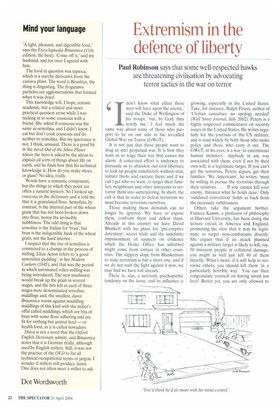Mind your language
'A light, pleasant, and digestible food,' says the Encyclopaedia Britannica (11th edition: the best). 'Come off it,' said my husband, and for once I agreed with him.
The food in question was tapioca, which is a starchy derivative from the cassava plant. The word is Brazilian, the thing is disgusting. The frogspawn particles are agglomerations that formed when it was dried.
This knowledge will, I hope, remain academic, but a related and more practical question arose while I was tucking in to some couscous with a friend. She asked if couscous was the same as semolina, and I didn't know. I eat but don't cook couscous and do neither to semolina. But my ignorance is not, I think, unusual. There is a good bit in the novel Out of the Silent Planet where the hero is asked by the aliens to explain all sorts of things about life on earth, and he finds how thin his technical knowledge is. How do you make shoes, or glass? No idea, really.
Words have a semantic component, but the things to which they point are often a natural mystery. So I looked up couscous in the dictionary and it told me that it is granulated flour. Semolina, by contrast, is the internal part of the wheat grain that has not been broken down into flour, hence the invincible nubbliness. The odd thing is that semolina is the Italian for 'bran', but bran is the indigestible husk of the wheat grain, not the hard interior.
I suspect that the rise of semolina is connected to a change in the process of milling. Eliza Acton refers to `a good semoulina pudding', in her Modem Cookery (1845), and that was the period in which automated roller-milling was being introduced. The new machinery would break up the grain in several stages, and the bits left at each of three stages were denominated semolina, middlings and, the smallest, dunst. Britannica warns against muddling middlings of this kind with the miller's offal called middlings, which are bits of bran with some flour adhering and are fit for nothing but animal feed — or health food, as it is called nowadays.
Dunst is not a word that the Oxford English Dictionary admits, and Britannica notes that it is German really, although used by English millers. Still, it was not the practice of the OED to list all technical occupational terms or jargon. I wonder if millers still produce dunst. One does not often meet a miller to ask.
Dot Wordsworth


















































































 Previous page
Previous page